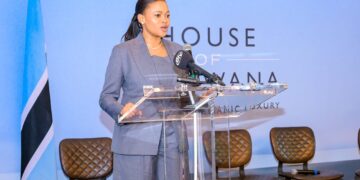• Tsaone Segaetsho
Rebecca Quartey-Papafio, Stakeholders and Government Affairs Lead at De Beers Group, has described the delayed and closely watched negotiations between the company and the Government of Botswana as a “blessing in disguise”, despite initial concerns that they might culminate in a disagreement.
Addressing the issue of trust, particularly in relation to Botswana’s then ruling party, Botswana Democratic Party (BDP), Quartey-Papafio acknowledged that tensions arose from the manner in which certain matters were framed and interpreted by stakeholders involved in the negotiations.
“Nonetheless, the trust between De Beers and the Government of Botswana not only endured but emerged stronger,” she affirmed.
“Everyone shared the same vision: a lasting legacy for diamonds, for the Batswana people and for shareholders alike.”
A key outcome of the protracted discussions is the Beneficiation Enterprises Development Programme, an initiative that aims to empower Batswana by encouraging active participation in the diamond industry.
Speaking on the sidelines of the African Mining Summit on Wednesday, Quartey-Papafio disclosed that the beneficiation programme, slated for launch in November, will focus on onboarding new citizen sightholders. She told The Executive Botswana that the initiative will support SMEs through the provision of product access, capacity-building, and market integration.
Another major gain from the new agreement is the Talent Working Development Programme, which was unveiled shortly after the formalisation of the deal in February. This initiative is designed to cultivate skills and create opportunities for young Batswana across the diamond value chain and beyond.
According to Quartey-Papafio, the programme includes scholarships, internships, leadership development coaching, and international placements. It also features several targeted sub-programmes, such as the International Graduate Development Programme, which commenced last month. These offerings aim to provide practical experience, career development pathways, and entrepreneurial support.
Despite early delays and disagreements, Quartey-Papafio emphasised the agreement’s long-term strategic benefits—among them, the Diamonds for Development Fund. This initiative, launched by De Beers in partnership with the Government of Botswana, is aligned with the country’s ambition to transition towards a knowledge-based economy and to advance economic diversification.
Under the fund, De Beers will commit an initial investment of BWP 1 billion, with total contributions potentially reaching BWP 10 billion. The fund underscores De Beers’ intent to deliver a transformative and sustainable socio-economic impact in close collaboration with the people of Botswana.
On broader developments, Quartey-Papafio also revealed that De Beers is progressing with the development of new mining operations in Angola following recent discoveries.
In response to the growing competition between natural and synthetic diamonds, she noted that De Beers is evolving its marketing strategy. The company now focuses on engaging contemporary consumers through digital platforms and influencer collaborations—moving beyond traditional marketing frameworks to retain relevance in a shifting global market.










